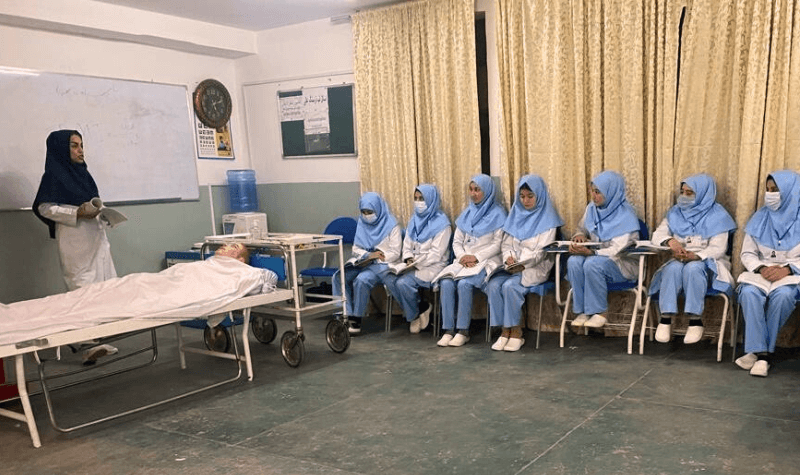A Chance for Women in Afghanistan to have a Career Future
With our training course, we are offering women in Afghanistan the chance of a professional future and, as nurses, they will then contribute to the medical care of the Afghan population.
The training is a unique opportunity for Afghan women to build a professional future.
Cap Anamur has been training Afghan women as midwives and nurses since 2009. Despite the regime change in 2021 and the current restrictions for women, which exclude them from universities, among other things, we can continue our education program.
Our teacher Hamelyar Hussei reports on the current training course, which we started in mid-September this year with 39 trainees.
In three years’ time, the participants will return to their home villages as registered nurses to provide medical care for the local population.
What profession did you learn and what area of work are you responsible for in our nursing training program?
I studied to be a nurse and passed my state exam in 2012. I’m currently working as a teacher and practical instructor in Cap Anamur’s ongoing nursing training program.
How many female students take part in the training and where do they come from?
We are now in the 14th week of the three-year training program in which 39 trainees are participating; 10 of them are from more remote districts such as Ghur and Badghis and others from the surrounding areas of the provincial capital Herat.

Herat was struck by an earthquake and several aftershocks this year. How did you experience the earthquake?
The earthquake was a terrible experience for all of us, many buildings here are not reliable. For fear of being buried, we set up camps in courtyards and gardens and normal life has collapsed. At some point it started to get really cold at night and there was also a sandstorm that lasted for several days. We are all still reeling from the shock. Fortunately, the epicenter was not in the center of Herat, otherwise there would certainly have been even more deaths. However, some villages were hit hard and entire families were killed and buried under the rubble of their homes.
A lot has changed in Afghanistan since the regime change. Can you still provide high-quality training under these conditions?
Despite more difficult conditions and stricter requirements, we try to maintain quality. We are able to do this thanks to the active support of Cap Anamur. This is how we receive work materials, accommodation and meals for the students and their children and our salaries. Thanks to Cap Anamur, we have the necessary conditions to maintain and improve the standard.

What are the chances of graduates of the Cap Anamur training program to find a job later on?
We remain in contact with our students after their training and the Ministry of Health also carries out inspections, awarding quality and performance points. So far, our graduates have always done very well. One of our nurses works furthest away from Herat in Farzi, 180 km from the provincial capital. Since the training takes place according to the national standard and curriculum, and the exam is also state-approved, and the level of our training is also known to be high, our students can later work anywhere in Afghanistan.
After the sixth grade, female students are currently not allowed to continue attending a public school. Won’t it be difficult to find female students at the required school level in a few years’ time? The entrance exams for the course are geared more towards 12th grade performance levels?
Yes, that will be a big problem in the future. Our main goal has always been to recruit female students from rural areas for the training. As well-educated and medically trained staff with a great deal of practical experience, they are then sent back to the remote regions of origin to improve medical care in rural areas. The provincial hospital has a very large catchment area and our students can gain a lot of valuable experience here. Under the current circumstances, we fear that girls in rural areas will no longer have access to education. In comparison, in the city you still have the chance to close the gaps in your education through private lessons at home, provided you have the financial means.

How do you assess the current medical care of the population in Herat Province?
Unfortunately, many programs, such as family planning, health education and vaccination campaigns, are stagnating. There is a shortage of staff, partly because many have fled the country. And existing female skilled workers are not allowed to travel to village regions, as this is made particularly difficult by government regulations.
How can you reach people when most of their everyday lives take place within their own four walls?
You could think about online training courses where you can only see hands etc. and hear voices, of course, but where you can impart a lot of theoretical knowledge. Of course, this is only possible for people who have access to the Internet. But it would be an opportunity to reach more women.
Do you have any ideas or suggestions for improvement?
Yes, I would like Cap Anamur to start the midwife training program again. There were enough trained midwives for a while, but now the situation has changed. There are also more patients due to many refugees returning to the country from Pakistan or Iran, and due to the emigration of trained staff, we are lacking midwives.

